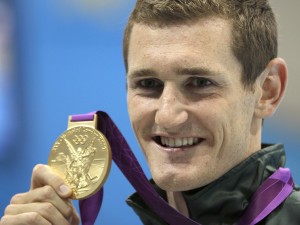
South Africa’s Cameron van der Burgh poses with his gold medal for the men’s 100-meter breaststroke swimming final at the Aquatics Centre in the Olympic Park during the 2012 Summer Olympics in London, Sunday, July 29, 2012. Van der Burgh set a new world record with a time of 58.46. AP/Matt Slocum
LONDON – Cameron van der Burgh hit the wall, turned around and checked the scoreboard. He had just become the first South African man to win an individual Olympic gold medal in swimming.
He splayed his body on the lane line, tucked his hands behind his head that rested against the wall, and smiled. Van der Burgh beat a stellar field in the 100-meter breaststroke with a world-record time of 58.46 seconds on Sunday, but his mind was mostly on his late friend and fellow swimmer Alexander Dale Oen of Norway.
“I looked up at the sky and thought he’s probably laughing down at us and thinking how can you go that time?” he said.
Dale Oen died in April at 26 from heart disease, leaving Norway without its best hope for a gold medal in the Olympic pool. He earned a silver in the 100 breast four years ago and won the world title last year.
He and van der Burgh were close, with Dale Oen having taken the South African under his wing since 2007 and teaching him the ropes of international swimming.
“When someone is in your life they always leave a part of them inside of you,” Van der Burgh said. “Tonight, I really felt him.”
Christian Sprenger of Australia earned the silver in 58.93 and Brendan Hansen of the U.S. took the bronze in 59.49 while swimming in Lane 8.
Van der Burgh joined Penny Heyns as the only South Africans to win individual swimming golds. Heyns swept the 100 and 200 breaststrokes at the 1996 Atlanta Games. The country also won gold in the men’s 4×100 freestyle relay in 2004.
Kosuke Kitajima of Japan finished fifth in his bid to become the first male swimmer to win an individual event for a third consecutive Olympics. He was timed in 59.79 swimming in the lane next to longtime rival Hansen.
“I didn’t realize he was next to me until we marched out,” Hansen said. “We have such a great respect for each other before we walked out we shook hands.”
Hansen felt vindicated after finishing second in 2004 and fourth in Beijing. He quit the sport after his second Olympic disappointment and did triathlons before deciding to make a comeback last year, following in the footsteps of such former greats as Janet Evans and Ian Thorpe. Neither was successful.
“I’m the only one here,” Hansen said.
“It’s just really good to be back on the podium again after missing it in Beijing and being the favorite in Athens and failing to get it. It’s probably my favorite moment in the Olympics and the hardest I’ve had to work for.”
Kitajima loomed large in van der Burgh’s mind, too.
“Early in the year he went 58.9. That was a real powerful message to everybody after Alex went 58.7 last year. Maybe today wasn’t his day, but you can’t take it away from the guy,” he said.
Kitajima swept the 100 and 200 breaststrokes in Athens and Beijing. He will try to defend his 200 title starting Tuesday.
“I was thinking a lot of things in the last three days and started having doubts while swimming.
This was very disappointing,” Kitajima said. “I didn’t have any technique I could be confident in, something I could think ‘Yes, I can go with this’. When my legs are moving OK, then my arms get bad.”
He took some time off after Beijing and then moved to Southern California to train in the same pool as American breaststroker Rebecca Soni.
“I made a lot of effort on myself and I prioritized myself instead of someone else,” he said. “I have enjoyed the comeback process until now but it may not be linked to the result. But I still have a chance in the 200. It is going to be a high-level race. I have to think about the 200 more seriously.”
Hansen could relate to Kitijima’s result after his off-the-podium finish four years ago.
“It’s one of those things where he may not have the most fire underneath him because he’s already done it twice,” he said. “It’s probably one of the most talented fields I’ve swum against. I don’t think it takes away from anything he’s done in the sport.”

